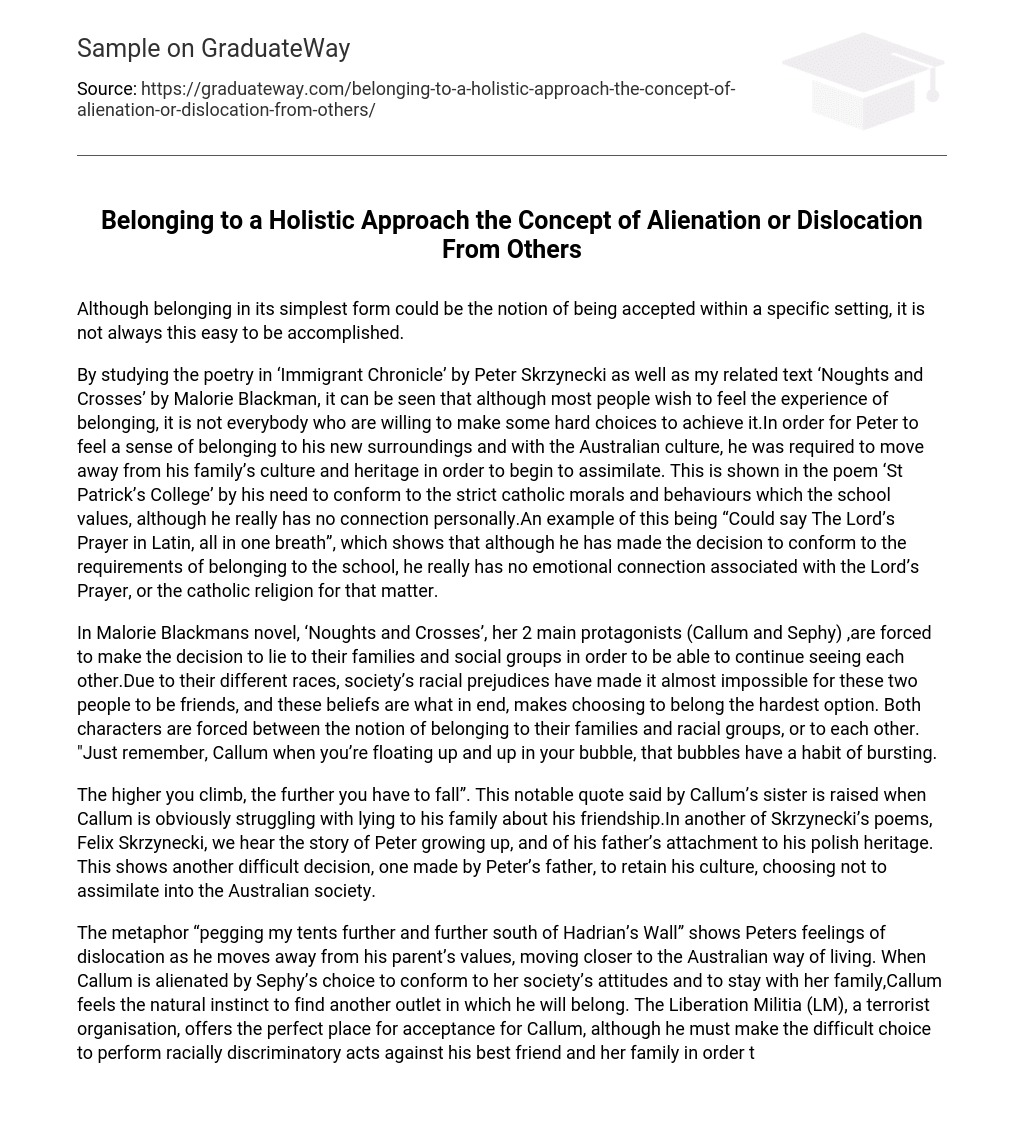Although belonging in its simplest form could be the notion of being accepted within a specific setting, it is not always this easy to be accomplished.
By studying the poetry in ‘Immigrant Chronicle’ by Peter Skrzynecki as well as my related text ‘Noughts and Crosses’ by Malorie Blackman, it can be seen that although most people wish to feel the experience of belonging, it is not everybody who are willing to make some hard choices to achieve it.In order for Peter to feel a sense of belonging to his new surroundings and with the Australian culture, he was required to move away from his family’s culture and heritage in order to begin to assimilate. This is shown in the poem ‘St Patrick’s College’ by his need to conform to the strict catholic morals and behaviours which the school values, although he really has no connection personally.An example of this being “Could say The Lord’s Prayer in Latin, all in one breath”, which shows that although he has made the decision to conform to the requirements of belonging to the school, he really has no emotional connection associated with the Lord’s Prayer, or the catholic religion for that matter.
In Malorie Blackmans novel, ‘Noughts and Crosses’, her 2 main protagonists (Callum and Sephy) ,are forced to make the decision to lie to their families and social groups in order to be able to continue seeing each other.Due to their different races, society’s racial prejudices have made it almost impossible for these two people to be friends, and these beliefs are what in end, makes choosing to belong the hardest option. Both characters are forced between the notion of belonging to their families and racial groups, or to each other. “Just remember, Callum when you’re floating up and up in your bubble, that bubbles have a habit of bursting.
The higher you climb, the further you have to fall”. This notable quote said by Callum’s sister is raised when Callum is obviously struggling with lying to his family about his friendship.In another of Skrzynecki’s poems, Felix Skrzynecki, we hear the story of Peter growing up, and of his father’s attachment to his polish heritage. This shows another difficult decision, one made by Peter’s father, to retain his culture, choosing not to assimilate into the Australian society.
The metaphor “pegging my tents further and further south of Hadrian’s Wall” shows Peters feelings of dislocation as he moves away from his parent’s values, moving closer to the Australian way of living. When Callum is alienated by Sephy’s choice to conform to her society’s attitudes and to stay with her family,Callum feels the natural instinct to find another outlet in which he will belong. The Liberation Militia (LM), a terrorist organisation, offers the perfect place for acceptance for Callum, although he must make the difficult choice to perform racially discriminatory acts against his best friend and her family in order to fit in with the LM. On page 203, Callum is quoted saying “we had to.
Our cell was ordered to do it…”when feeling as though he must justify why he took part in planting bombs in a shopping centre full of the Black people (the more exclusive race).The attitudes of the characters in the novel do evolve over time, as the novel (and series) progress, although it is not without a lot of difficulty that this change occurs. It is only when Sephy gains the courage to step away from belonging to either her family or Callum that she comes to realise what she is living for, her unborn child. She makes the very confronting decision that for a complete sense of belonging to occur, she must step away from the constraints of her society and focus on the life of her baby and how she will support its life.
The use of collective noun in Skryznecki’s poem ‘Migrant Hostel’ in the line “nationalities sought each other out instinctively” highlights the migrants choice to stick to the culture and people in which they have attachment and connections with. This decision, although seemingly the simplest choice, could be seen to have a difficult side as the migrant’s shared common wartime and horrific memories which would be reminisced upon because of the sense of belonging and attachment.Through analysis of both ‘Immigrant Chronicle’ and ‘Noughts and Crosses’ it has become apparent that although humans naturally seek out the feeling of connection to others within society, the simple concept of ‘fitting in’ is nowhere near as simple as it may seem at face value. Therefore, it seems to me as if in order to belong from a holistic approach, the notion of alienation or dislocation from others, which comes from having to make important, but demanding decisions must be present for the true meaning of ‘Belonging’ to be gratified.





